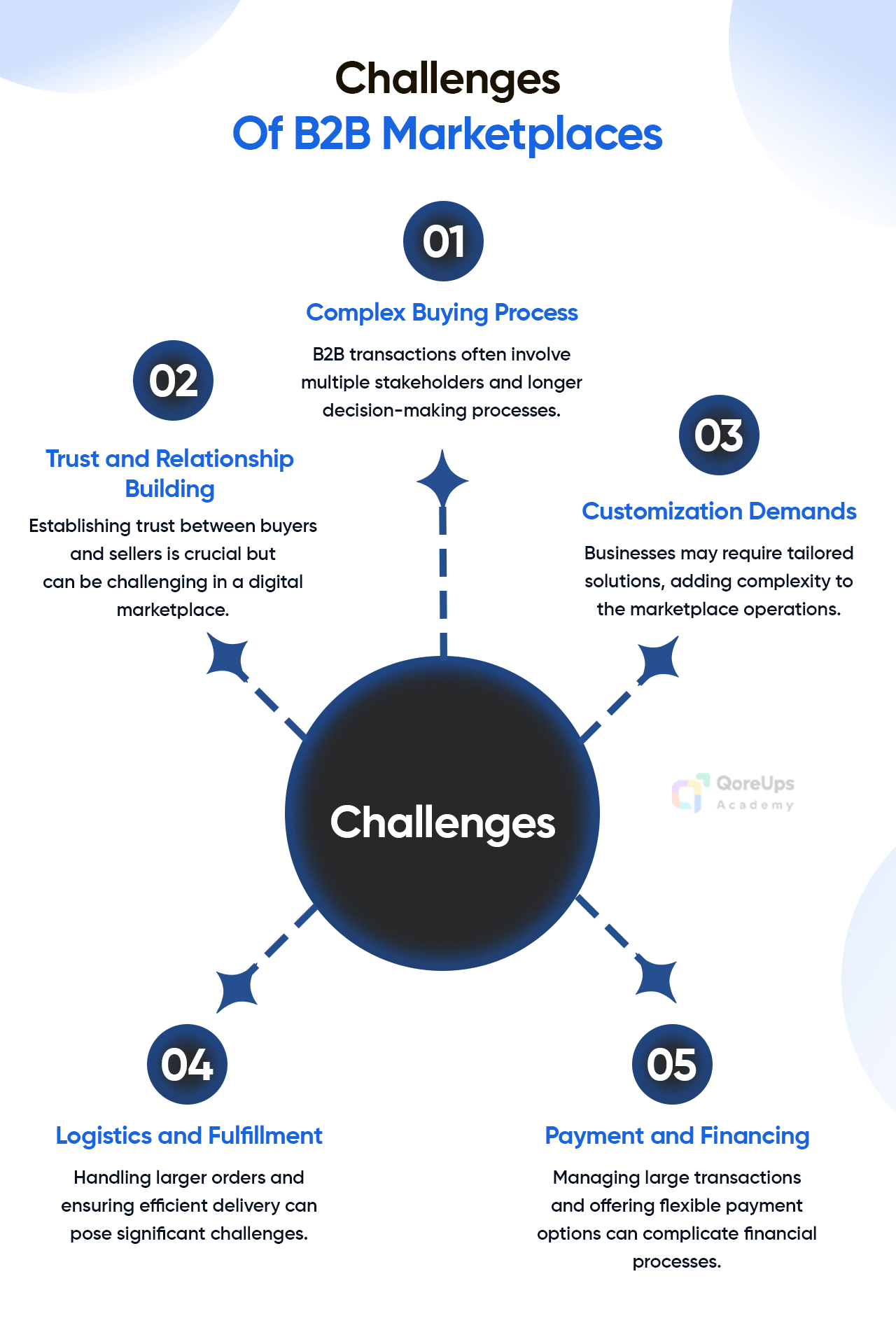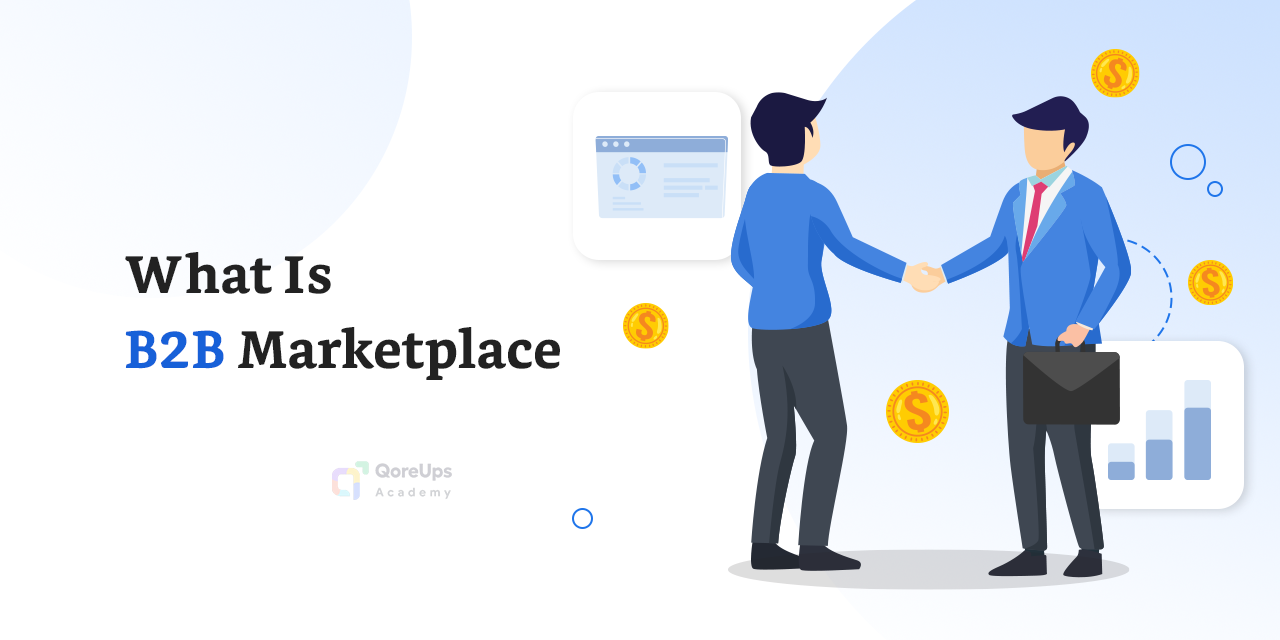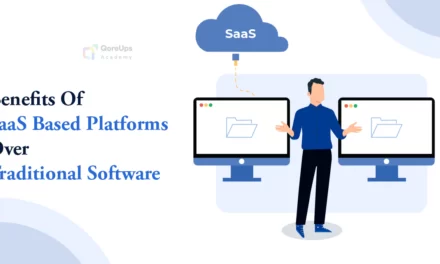Imagine a world where businesses of all sizes, spanning industries and continents, converge on virtual platforms to engage in commerce, forge partnerships, and unlock new growth opportunities.
This is the reality of the modern B2B marketplace.
A dynamic ecosystem that transcends borders empowers businesses and reshapes the future of commerce as we know it.
These platforms facilitate transactions, partnerships, and collaborations between businesses across various industries and geographical locations.
We will delve deep into the essence of B2B marketplaces, uncovering their historical evolution, current landscape, and emerging trends.
From the early days of online trading to the dawn of marketplace platform ecosystems, we will trace the trajectory of B2B Marketplace. Also, unveil the transformative potential that lies ahead.
Let’s start with the basics.
What Is B2B Marketplace?
A B2B marketplace serves as an online platform where businesses engage in commerce with other businesses.
Unlike B2C (business-to-consumer) platforms that target individual consumers, Business to Business marketplaces cater exclusively to the needs of businesses.
The B2B marketplace offers a wide range of products, services, and solutions tailored to their specific requirements.
Key Characteristics of Business To Business Marketplaces
- Complex Pricing Structures: B2B transactions often involve negotiated pricing based on factors such as volume, frequency, and contractual agreements.
- Bulk Purchasing Options: Businesses have the flexibility to purchase goods and services in large quantities, aligning with their operational needs.
- Customization and Personalization: B2B marketplace builder offers the ability to customize products, services, and pricing based on individual business requirements.
- Extended Sales Cycle: Due to the complexity of B2B transactions and the involvement of multiple stakeholders, the B2B marketplace tends to have long sales cycle
- High-Level Customer Service: B2B marketplaces prioritize customer service, providing dedicated support to address the unique needs and challenges of businesses.
Types Of B2B Marketplaces
When diving into the world of B2B marketplaces, it’s essential to understand the different types available, as each serves a unique purpose and audience.
Horizontal Marketplaces
These platforms offer a wide range of products and services across multiple industries.
They cater to various business needs and are typically used by businesses looking for suppliers in different sectors.
Example: Alibaba.
Vertical Marketplaces
These focus on specific industries or niches, offering specialized products and services tailored to the needs of businesses within that sector.
Example: ThomasNet for the industrial sector.
Product-Based Marketplaces
These platforms are focused on selling physical products. Businesses use these platforms to source goods, materials, and supplies in bulk.
Example: Amazon Business.
Service-Based Marketplaces
These cater to businesses seeking professional services such as consulting, IT, marketing, or legal services.
Example: Upwork for freelancers and business services.
Hybrid Marketplaces
These platforms combine both product and service offerings. Businesses can purchase products while also hiring services from the same platform.
Example: Global Sources.
By categorizing these marketplaces, businesses can better identify which type aligns with their needs and the needs of their customers, thereby maximizing their potential for success.
Benefits Of Using B2B Digital Marketplaces For Business
The rise of digital B2B marketplaces has transformed the way businesses operate, bringing numerous advantages that streamline processes and enhance competitiveness.
These platforms not only simplify procurement but also allow businesses to access a wider network of suppliers and customers.
- B2B marketplaces offer access to a broader range of buyers and sellers, enabling businesses to expand their market reach beyond local or regional boundaries.
- By streamlining the procurement process and reducing the need for intermediaries, B2B marketplaces help businesses operate at low costs.
- Marketplaces provide an organized, centralized platform for businesses to source products and services, reducing the complexity of procurement.
- B2B marketplaces provide analytics and reporting tools, giving businesses insights into buyer behavior, sales trends, and market demand.
- Most B2B marketplaces have built-in mechanisms for reviewing and rating suppliers, which fosters trust and transparency between buyers and sellers.
- Digital marketplaces are scalable, allowing businesses to expand their operations without needing to significantly increase their overhead or infrastructure.
As companies increasingly turn to digital solutions to improve efficiency, understanding the key benefits of B2B marketplaces can help organizations make informed decisions about their purchasing and sales strategies.

Difference Between B2B And B2C Marketplaces
While B2B and B2C marketplaces both serve to facilitate commerce, they operate in fundamentally different ways.
Understanding these differences is crucial for businesses looking to navigate the digital marketplace landscape effectively.
Let’s see the key distinctions between B2B and B2C marketplaces, including their target audiences, purchasing behaviors, pricing models, and sales cycles.
Recognizing these differences can empower businesses to tailor their strategies and approaches accordingly.

Notable B2B Marketplace Examples
Across various industries and sectors, B2B marketplaces have proliferated, offering specialized platforms tailored to specific niches and markets.
Let’s see some notable B2B marketplace examples:
Amazon Business
Launched in 2015, Amazon Business quickly emerged as a dominant player in the B2B marketplace space. It offers a wide range of products, business-specific pricing, and streamlined procurement processes.
eBay Business & Industrial
eBay’s Business & Industrial platform provides businesses with a dedicated marketplace for buying and selling. It includes industrial equipment, machinery, and supplies, catering to the needs of manufacturers, distributors, and service providers.
Alibaba’s Global Expansion
Alibaba’s expansion into international markets further solidified its position as a leading B2B marketplace platform. It connects businesses across the globe and facilate cross-border trade on a massive scale.
Evolution of Online B2B Marketplace Solutions
Over the years, online marketplace solutions have evolved significantly. Because driven by advances in technology, changing market dynamics, and evolving customer expectations.
Modern online marketplace solutions offer a host of features and functionalities designed to enhance efficiency. Also, streamline operations, and facilitate seamless transactions.
Role of Online B2B Marketplaces in 2024
In 2024, online marketplace solutions play a pivotal role in the global economy, by serving as vital hubs for commerce, collaboration, and innovation.
These online marketplace solutions offer a multitude of benefits for businesses, including:
- Strategic Sourcing: B2B marketplaces enable businesses to discover new suppliers. Also, evaluate options, and negotiate favorable terms, driving cost savings and operational efficiency.
- Market Expansion: By leveraging online B2B marketplaces, businesses can expand their reach to new markets and geographies, accessing a global network of buyers and sellers.
- Streamlined Procurement: The streamlined procurement processes offered by B2B marketplaces help businesses save time and resources, enabling them to focus on core competencies and strategic initiatives.
- Business Growth: By facilitating transactions and partnerships, B2B marketplaces fuel business growth and expansion, driving revenue, and profitability.
How Does An Online B2B Marketplace Platform Work?
B2B marketplaces serve as digital hubs where businesses can connect, trade, and collaborate.
Understanding the inner workings of these platforms is crucial for both buyers and sellers looking to leverage their benefits effectively.
Let’s delve into the step-by-step process of how an online B2B marketplace platform works:
Registration and Profile Creation:
- Buyers and Sellers Register: Both buyers and sellers need to register on the platform to access its features and functionalities.
- Sellers Create Detailed Profiles: Sellers create comprehensive profiles that showcase their offerings, including product catalogs, company information, and contact details.
Product Listings
- Sellers Upload Product Information: Sellers upload detailed information about their products, including descriptions, images, specifications, and prices.
- Buyers Search for Relevant Products: Buyers use search filters and keywords to find products that match their specific requirements.
Search and Discovery
- Buyers navigate the online B2B marketplace platform to explore the available products and services, using advanced search features to refine their search results.
- Advanced search functionalities help buyers find the right products efficiently, allowing them to filter results based on parameters such as price range, product category, location, and seller ratings.
Negotiation and Communication
- Buyers have the option to inquire about products, negotiate prices, and discuss terms directly with sellers.
- The online B2B marketplace platform provides real-time communication tools such as messaging systems or chatbots to facilitate seamless interactions between buyers and sellers.
Order Placement and Payment
- Once buyers are satisfied with the product and terms, they can place orders directly through the platform.
- Payment gateways integrated into the platform handle transactions securely, offering multiple payment options such as credit cards, bank transfers, or digital wallets.
Fulfillment and Logistics
- Sellers are responsible for managing their inventory, processing orders, and arranging shipping and delivery.
- Buyers receive timely updates on the status of their orders, including order confirmation, shipment tracking, and delivery notifications.
Reviews and Ratings
- After receiving their orders, buyers have the opportunity to leave reviews and ratings for the sellers based on their experience.
- Transparency in the review and rating system builds trust within the marketplace software, helping buyers make informed decisions and fostering a reputation-based ecosystem.
By following this structured process, the online B2B marketplace platforms streamline the buying and selling process, enhance transparency, and facilitate efficient transactions between businesses.
Whether it’s sourcing raw materials, procuring equipment, or securing services, online B2B marketplace platforms provide a centralized platform for businesses to meet their diverse needs and objectives.
How To Start A B2B Marketplace
Starting a successful B2B marketplace requires careful planning and execution.
For businesses considering this venture, it’s essential to follow a structured approach that encompasses market research, platform development, and effective marketing strategies.
Market Research
Begin by conducting thorough market research to understand your target audience’s needs and pain points. Engage potential users through surveys and interviews to gather insights into their challenges and preferences. Analyze existing marketplaces to identify gaps in services and offerings, which will help you position your platform effectively.
Choose a Niche
Selecting a specific niche is crucial. You can opt for a vertical marketplace that focuses on a particular industry, such as healthcare or manufacturing, or a horizontal marketplace that offers a variety of products across multiple sectors. A clear niche will allow you to tailor your marketing efforts and brand messaging.
Select a Business Model
Decide on a revenue generation model for your marketplace. Common models include:
- Transaction Fees: Charge a percentage of each sale made through the platform.
- Subscription Fees: Offer tiered subscription plans with varying access to features.
- Listing Fees: Charge sellers for product listings on your platform.
- Advertising: Provide promotional opportunities for vendors to increase visibility. Choose a model that aligns with your target market and offers value.
Build the Platform
Develop your marketplace using one of several approaches: custom development for a unique solution, a marketplace clone script for quicker setup, or a SaaS platform for ease of use. Ensure your B2B marketplace platform is user-friendly, scalable, and secure.
Onboard Sellers
Attract and onboard sellers by reaching out to potential vendors and offering incentives, such as lower fees for early adopters. Provide sellers with the tools and support they need to succeed, including analytics and marketing resources.
Focus on Marketing
Implement a comprehensive marketing strategy that incorporates SEO, content marketing, social media, and email campaigns. This will help you attract both buyers and sellers to your platform.
Optimize Operations
Continuously monitor and optimize your marketplace operations. Gather user feedback, analyze performance data, and make necessary adjustments to enhance user experience and maintain growth.
How Do B2B Marketplaces Make Money?
Understanding the monetization strategies employed by B2B marketplaces is vital for businesses looking to invest in or leverage these platforms.
Each marketplace may adopt various revenue models that cater to their unique business structures and market needs.
B2B marketplaces generate revenue through a variety of monetization models, which include:
Transaction Fees
The marketplace charges a percentage of each transaction made between buyers and sellers. This is a common model in both B2B and B2C platforms.
Subscription Fees
Businesses pay a recurring fee to gain access to the marketplace. This is typically tiered, with higher fees offering more features, such as analytics, marketing tools, or priority listings.
Listing Fees
Vendors are charged for listing their products on the marketplace. This model is useful for marketplaces that want to monetize vendor participation rather than transaction volume.
Advertising
Marketplaces often allow businesses to promote their products or services through paid advertising. This can include sponsored listings, banners, and product recommendations.
Value-Added Services
Many B2B marketplaces offer additional services like logistics, warehousing, payment processing, and financing. They charge businesses for these supplementary services.
Commission-Based Model
In some B2B marketplaces, the platform earns a commission for each sale facilitated through its platform. The commission rates can vary depending on the deal size.

Challenges Of B2B Marketplaces
Despite the numerous advantages that B2B marketplaces offer, they are not without their challenges.
Businesses must navigate a range of issues, from the complexities of the buying process to the need for trust and relationship building.
Complex Buying Process
Challenge: B2B transactions often involve multiple decision-makers, longer sales cycles, and customized orders, complicating the buying process.
Solution: Implement user-friendly interfaces and tools that simplify the buying process, such as guided purchasing flows and clear communication channels for stakeholders.
Trust and Relationship Building
Challenge: Establishing trust between buyers and sellers is crucial in B2B markets, as credibility and reliability are significant challenges.
Solution: Foster trust by implementing robust verification processes for sellers, providing user reviews, and offering buyer protection policies to enhance credibility.
Customization Demands
Challenge: Businesses often require tailored solutions, bulk orders, and personalized pricing, which can be difficult for marketplaces to manage efficiently.
Solution: Develop features that allow for customization, such as advanced filtering options for product variations, and provide options for bulk pricing directly on the platform.
Logistics and Fulfillment
Challenge: Larger B2B orders complicate fulfillment, requiring specialized logistics solutions and careful planning.
Solution: Collaborate with logistics providers to create efficient fulfillment solutions and leverage technology for order tracking and inventory management.
Payment and Financing
Challenge: Managing large transactions, offering credit, and ensuring secure payment methods add complexity to B2B marketplaces.
Solution: Offer multiple payment solutions, including credit options and secure payment gateways, and establish financing programs to assist buyers with large purchases.
Market Competition
Challenge: B2B marketplaces face stiff competition from existing players and new entrants, making differentiation crucial.
Solution: Clearly define and communicate your marketplace’s unique value proposition through specialized services, targeted marketing, and exceptional customer support.
Integration With Business Systems
Challenge: Many B2B companies use software systems that may not easily integrate with marketplace platforms, complicating adoption.
Solution: Develop APIs and integration tools that facilitate seamless connections between the marketplace and existing business systems, making adoption easier for users.

Best Practices for Utilizing Online B2B Marketplace Solutions
To maximize the value derived from online B2B marketplace solutions, businesses should adopt the following best practices:
- Thorough Research: Conduct thorough research to identify the most suitable online B2B marketplace solutions for your business needs, considering factors such as industry focus, geographic coverage, and platform features.
- Clear Objectives: Define clear objectives and goals for leveraging the online B2B marketplace solution, whether it’s expanding market reach, reducing procurement costs, or enhancing supplier relationships.
- Optimized Listings: Optimize product listings and profiles to attract potential buyers, highlighting key features, benefits, and competitive advantages.
- Effective Communication: Maintain open and transparent communication with buyers and sellers on the platform, responding promptly to inquiries, resolving issues, and building trust and credibility.
- Continuous Improvement: Continuously monitor and evaluate performance metrics, such as sales, conversion rates, and customer satisfaction, and iterate on marketing strategies to improve results over time.
Looking Forward: The Future of B2B Marketplaces
Looking ahead to the future, the trajectory of B2B marketplaces is poised for continued growth, innovation, and disruption.
As technology continues to advance and market dynamics evolve, several key trends and developments are expected to shape the future of B2B marketplace solutions.
Platform Ecosystems
- Expansion of Services: B2B marketplaces will evolve into comprehensive platform ecosystems, offering a wide range of services beyond traditional transactional capabilities, including financing, logistics, digital marketing, and business analytics.
- Partnerships and Integrations: B2B marketplaces will form strategic partnerships and integrations with third-party service providers, enabling businesses to access a broader array of solutions and seamlessly manage their entire supply chain ecosystem.
Globalization and Cross-Border Trade
- Facilitation of Cross-Border Transactions: B2B marketplaces will facilitate cross-border trade by connecting businesses from different regions and providing tools and resources to navigate regulatory compliance, currency exchange, and international shipping logistics.
- Localization and Regionalization: B2B marketplaces will localize their platforms and services to cater to the unique needs and preferences of regional markets, adapting pricing, language, and cultural nuances to enhance the user experience and drive adoption.
Hyper-Personalization and Customer Experience
- Hyper-Personalization: B2B marketplaces will leverage advanced data analytics and machine learning algorithms to deliver hyper-personalized experiences, tailoring product recommendations, marketplace pricing, and promotions to individual customer preferences and behavior.
- Enhanced Customer Experience: B2B marketplaces will focus on enhancing the end-to-end customer experience, from the initial product discovery and procurement process to post-sale support and ongoing relationship management, fostering loyalty and driving repeat business.
The B2B marketplace landscape in 2024 is characterized by innovation, collaboration, and growth.
As businesses continue to embrace digital transformation and leverage online B2B marketplaces to drive value and competitiveness, the role of these platforms will become increasingly integral to the fabric of the global economy.
By understanding the essence of B2B marketplaces, embracing best practices, and staying ahead of emerging trends, businesses can position themselves for success in the dynamic and evolving landscape of B2B commerce.
Key Takeaways
- B2B marketplaces serve as online platforms where businesses engage in commerce with other businesses, offering a wide range of products, services, and solutions tailored to their specific requirements.
- Notable B2B marketplace examples include Alibaba, Amazon Business, and eBay, each catering to different industries and market segments.
- The evolution of online B2B marketplace solutions has been driven by advancements in technology, including AI, blockchain, and ERP integration, enabling businesses to streamline operations and drive growth.
- In 2024, B2B marketplaces play a vital role in the global economy, offering benefits such as strategic sourcing, market expansion, streamlined procurement, and business growth.
- Best practices for utilizing online B2B marketplaces include thorough research, clear objectives, optimized listings, effective communication, and continuous improvement.
- Emerging trends in B2B marketplaces include AI and automation, sustainability and ethical sourcing, integration with emerging technologies, platform ecosystems, globalization and cross-border trade, hyper-personalization, and enhanced customer experience.
- The future outlook for B2B marketplaces is characterized by continued growth, innovation, and disruption, driven by trends such as platform ecosystems, globalization, hyper-personalization, and enhanced customer experience.






